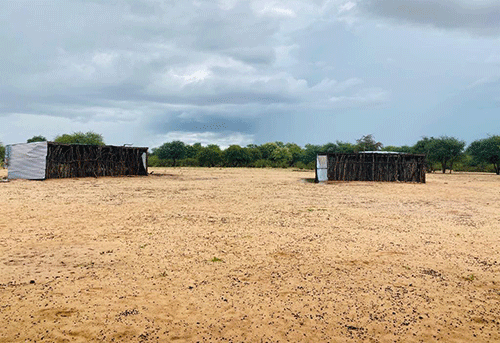ONGWEDIVA – The shortage of classrooms in the country remains one of the challenges confronting the education sector.
This is proven after the education ministry’s executive director, Sanet Steenkamp revealed that there are 412 improvised classrooms in Oshikoto region.
She said this in response to questions sent to her regarding learners at Twapandula Primary School in Oshikoto region, who are taught under unconducive conditions due to a lack of classrooms at the school.
On Monday, this publication reported that these learners are taught in the mud while the rain pours on them through a leaking roof.
Steenkamp affirmed that the ministry has an accelerated infrastructure development plan in place that it will present to the Ministry of Finance for funding.
“But we all look forward to the financial year 2023/24. Should we be receiving reasonable capital for projects, we are consolidating all the needs of the regions in terms of teachers, classrooms and furniture,” she alluded. She also added that since the headcounts are completed in some regions, the ministry is finding facilities for the learners to be accommodated.
“Only then we will be able to know how much money will be allocated in the budget from the Ministry of Finance. We will know how much to allocate to the education basic facilities budget to the regions and the regions are responsible to prioritise the constructions of classrooms, sanitation facilities, and administration blocks,” she explained.
Acknowledging the severe backlog of classrooms in the regions, Steenkamp said once funds are available, the ministry will accelerate the construction of classrooms.
Last year, the ministry said it is facing a shortage of 4 479 classrooms for both secondary and primary schools.
To help curb this shortage, last week President Hage Geingob called for the urgent acceleration of plans to construct classrooms by using August 26, a defence force company, to do the work.
Speaking to New Era, the Education director in the region, Aletta Eises said every year the directorate is constructing four to 12 classrooms.
In 2020, the directorate spent N$74 million to build ablution facilities; hostels and also renovated some hostels while in 2021 it has spent about N$2.7 million, and N$3.06 million in 2022. According to Eises, N$717 million was received from the European Union for the construction of 17 pre-primary classrooms.
So far, 13 pre-primary classrooms are completed.
“One classroom is at a 70% progress rate while three classrooms are not completed as the contractor was struggling to complete the construction and the contract has been terminated,” she said. Eises acknowledge that the infrastructure challenges are real and complex in the region.
“Infrastructure development and construction of classrooms, ablution facilities, libraries and laboratories depend on the development budget we received annually. If the budget is sufficient we will be able to construct conventional infrastructures at all our schools,” she said.
She said an increase in the renovation budget will help to address the crumbling infrastructure and backlog. In the meantime, the directorate also reaches out to businesses and various education partners for assistance.
“Through friends in education and development partners such as the Chinese and the Japanese embassies, many classrooms were built in the region,” said the director.
In terms of Twapandula, Eises said they are re-looking at how best to assist the school with the help of the ministry.
Statistics from the directorate state that the region is in need of 479 classrooms.
The region only has 22 clay brick classrooms that are in a dilapidated state.
It has 412 sheds/informal classrooms and 109 prefabricated classrooms.
“All stakeholders should show the needed interest and support to education in terms of pledging to infrastructure development and construction of classrooms, sharing expertise, assist learners with the tools to advance easily in the educational landscape.
“Spending on education is an investment in the future of the learners and the country. We all should have a common understanding and interest in education and come up with structured solutions and interventions for the betterment of our schools,” she said, as she calls for contribution to the inclusive quality education to the Namibian child.


